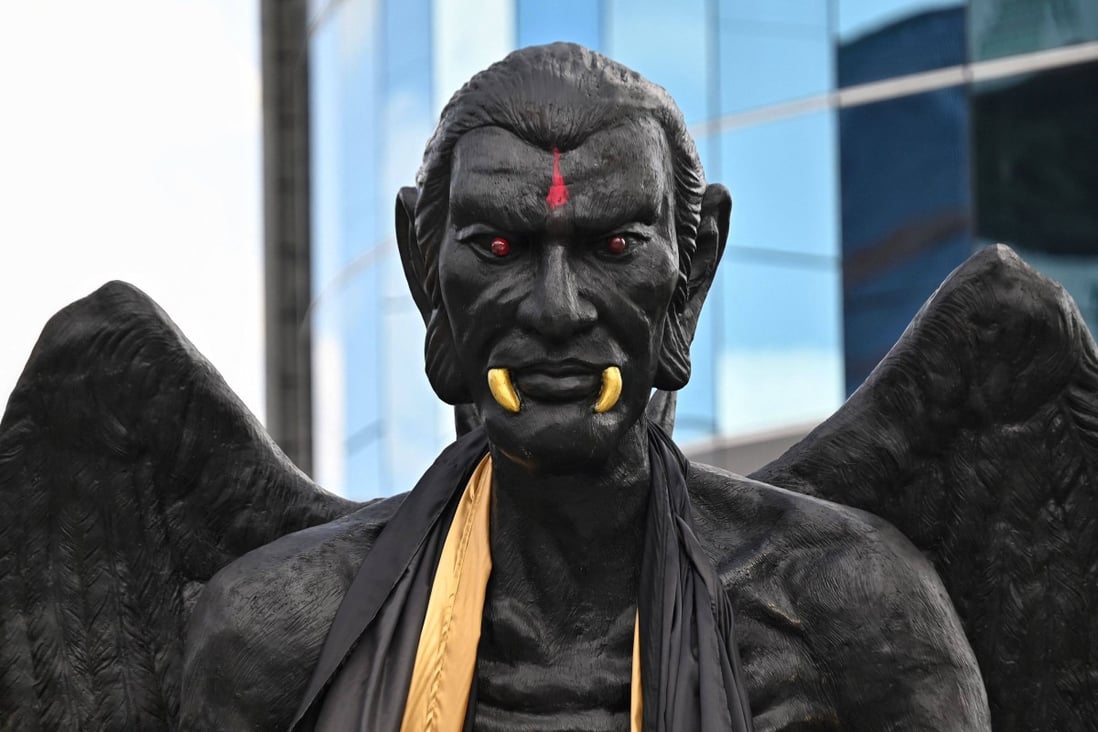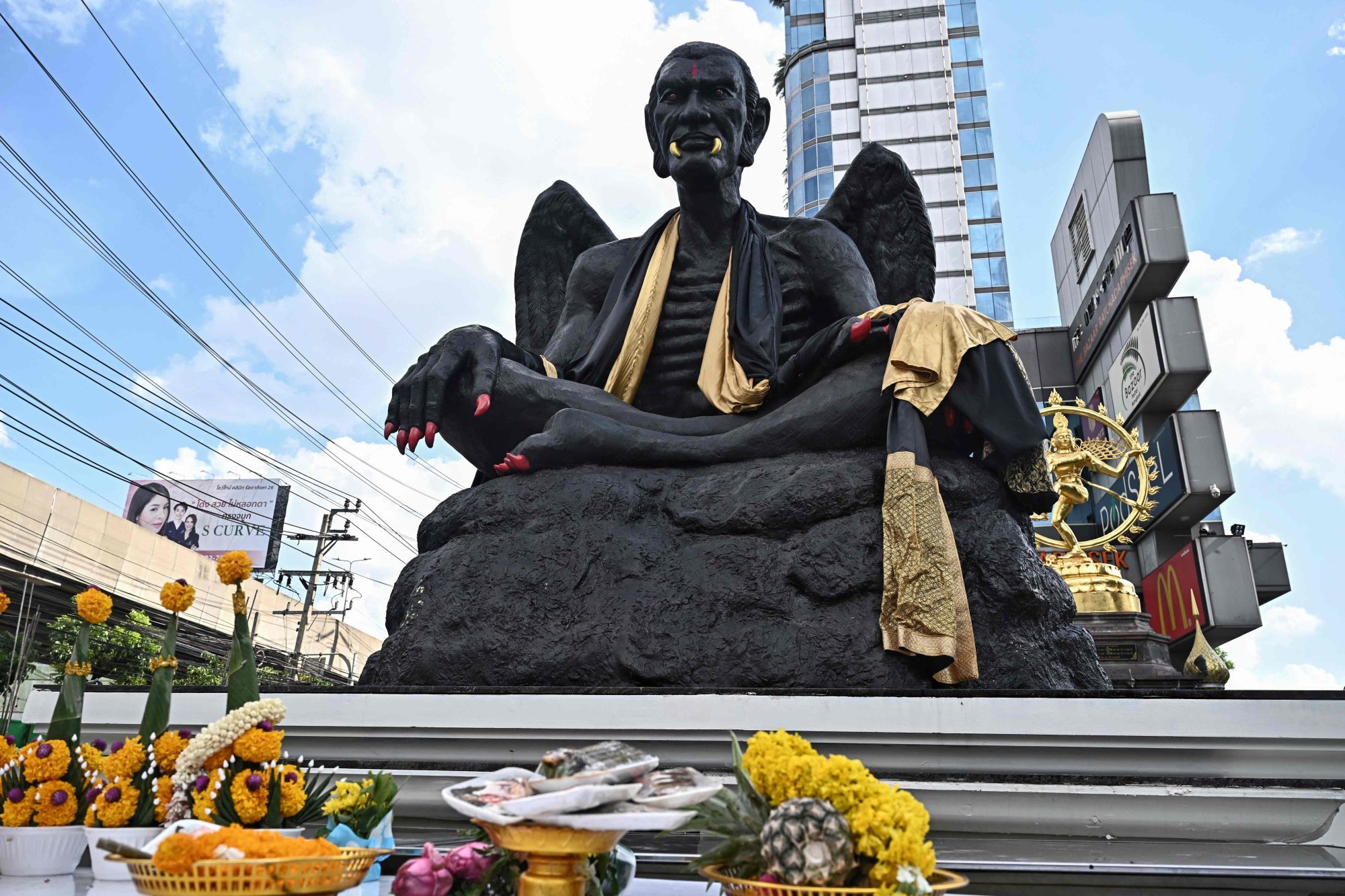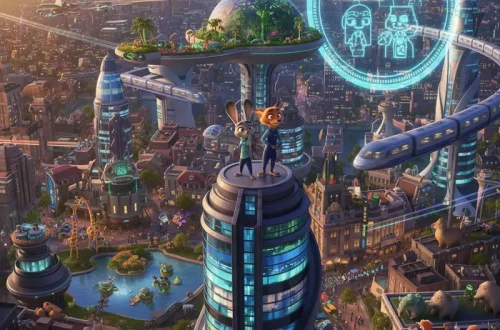
Standing at a towering height of 5 meters, the Kru Kai Kaew statue has become a focal point of both intrigue and controversy in the bustling streets of Bangkok. This imposing sculpture portrays a bald, winged figure adorned with golden fangs and scarlet talons. Erected just outside the prestigious Bazaar Hotel, the statue’s sudden appearance earlier this month has triggered a wave of diverse opinions.
To some, the Kru Kai Kaew statue embodies the embodiment of prosperity, a ‘god of wealth’ that promises bountiful blessings. Yet, its presence has also invoked a sense of unease and disturbance, with many finding it at odds with the tenets of Buddhism, labeling it as ‘something random’ and potentially even sacrilegious. The debate has escalated to the point where city authorities have launched an official investigation into the matter, seeking to unravel the statue’s meaning and implications.
Bangkok, a city known for its rich spiritual landscape, hosts a multitude of shrines and sites dedicated to various spirits and deities. These spiritual spaces often serve as points of devotion, with locals and visitors alike leaving offerings in hopes of invoking positive change and good fortune. However, the Kru Kai Kaew statue’s unconventional appearance and unclear origin have spurred a unique dispute within this already diverse spiritual tapestry.

Installed just outside the Bazaar Hotel, the statue has spurred conversations about its authenticity and alignment with Buddhist beliefs. The hotel asserts that it was not directly responsible for the statue’s placement; instead, it was installed by a third party that rented the land. This distinction has raised questions about the statue’s rightful place and significance within the city’s spiritual and cultural context.
The opposing views on the statue’s nature and purpose reflect a broader conversation about the evolving nature of faith and tradition in a modern world. The Artists’ Council for the promotion of Buddhism of Thailand, for instance, has voiced concerns over the statue’s adherence to Buddhist principles, highlighting the importance of aligning spiritual practices with established beliefs.
Despite the controversies and uncertainties surrounding the Kru Kai Kaew statue, some individuals have reported positive experiences and outcomes attributed to their interactions with it. For instance, Napapat Kanyabandit, a smoothie seller, attests to the statue’s sacred nature, claiming that her business has flourished following an offering she made at the statue’s base.
As debates continue to unfold, the statue’s enigmatic origins remain shrouded in mystery. Buddhism expert Sinchai Chaojaroenrat suggests that the statue could be rooted in folklore, with various interpretations suggesting connections to shamanistic traditions or historical figures from neighboring Cambodia.
Although the Kru Kai Kaew statue’s divine powers are subject to skepticism, its impact on the Bazaar Hotel’s fortunes has been undeniably positive. The hotel’s representative, Charlie Noppawong Na Ayuddhaya, notes a significant increase in bookings since the statue’s installation, demonstrating the statue’s unforeseen economic influence on the area.
In the heart of Bangkok’s spiritual and cultural milieu, the Kru Kai Kaew statue stands as a symbol of the intricate interplay between tradition, belief, and modernity. While its significance and place within the larger spiritual landscape remain contested, the statue has undeniably sparked discussions that transcend the boundaries of faith and tradition.
We bring out some of the most well-known Disney collection, all of which are available at reasonable costs. Visit our link now if you are interested in the Disney collection


Nala, Scar, Mufasa, Timon, Pumbaa
